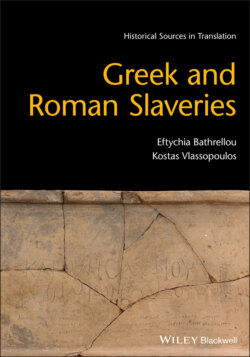Читать книгу Greek and Roman Slaveries - Eftychia Bathrellou - Страница 51
2.6 IC IV 72 ii2–10: Inscribed Laws in Greek, Gortyn, Crete (Fifth Century BCE)
ОглавлениеThe provisions below belong to the famous Gortyn Code. The term doōlos (doulos in Attic Greek) is a typical Greek term for “slave”; the term woikeus (oiketês in Attic Greek) is also commonly used for “slaves.” The use of both terms in the same legal texts has created a debate between scholars who think they have the same meaning and those who think that doōlos refers to slaves, while woikeus to a different group of “serfs.” The term apetairos, which literally means one excluded or banished from a hetaireia (that is, an association of “comrades”), seems here to refer to a free man but of a status lower than that of full citizens.
Literature: Link 2001; D. M. Lewis 2013, 2018: 147–65; Gagarin and Perlman 2016: 345–50.
If he (i.e. a free man) rapes a free man or a free woman, he shall pay 100 staters.28 If he rapes an apetairos, 10 staters. If a doōlos rapes a free man or a free woman, he shall pay double. If a free man rapes a woikeus, whether male or female, he shall pay 5 drachmas. If a woikeus rapes a male or a female woikeus, he shall pay 5 staters.
What fines for rape does this law envisage?
What status terms are employed in this passage?
Do doōlos and woikeus both refer to slaves?
If they refer to different groups, are there provisions for the rape of woikeus by a doōlos? If not, why?
If doōlos and woikeus refer to the same group of people, how can we explain that both terms are used in the same passage?
What can we learn about the Greek vocabulary of slavery from this text?
